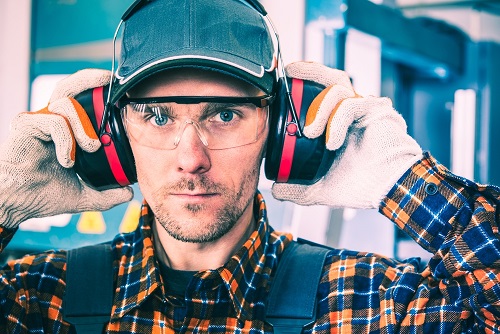Each year, about 22 million U.S. workers are exposed to dangerous noise levels at work. Repeated noise can damage your hearing. Even a loud, one-time noise can cause lasting damage. Earplugs and earmuffs can cut noise by 15 to 30 decibels when correctly fitted. These tips can help you protect your hearing on the job:

1 Know what is too loud.
OSHA requires employers to provide free hearing protection when sound levels average more than 85 decibels in general industry or 90 decibels in construction in an 8-hour day. These noise levels are about the same as those from lawnmowers, shop tools, or truck traffic. Generally, noise is at a dangerous level if you have to raise your voice to talk to someone a few feet away or if you can’t hear someone speaking to you from less than 2 feet away. Another sign of hazardous noise is a ringing or tingling in your ears for several hours after exposure.
2 Ensure earplugs block the ear canal with an airtight seal.
Choose earplugs that are the right shape and size for your ears. Earplugs protect better against low-frequency noises like a loud tractor.
3 Choose earmuffs that fit firmly over the outer ear.
Earmuffs protect well with high-frequency noises like pneumatic tools. They must form an airtight seal over the entire ear to provide the best protection. Eyeglasses or long hair can interfere with a correct seal.
4 Wear earplugs and earmuffs together when exposed to extreme noise.
Wearing earplugs and earmuffs together adds 10 to 15 decibels of hearing protection. If you are exposed to noise greater than 105 decibels – slightly louder than most chainsaws or pneumatic drills – consider wearing both.5 Consider noise-canceling earphones.
Noise-canceling earphones are available to block loud background noise. These can be worn when flying or in other noisy transportation or work environments. Some reports suggest that noise-canceling earphones reduce stress, increase productivity, and help alleviate jet lag and travel fatigue.
For more information on hearing protection, download or stream any of the free DWC-Workplace Safety publications or videos. DWC safety training specialists and consultants are also available to help create or revise your company’s hearing conservation program by contacting 800-252-7031, option 2, or SafetyTraining@tdi.texas.gov.
